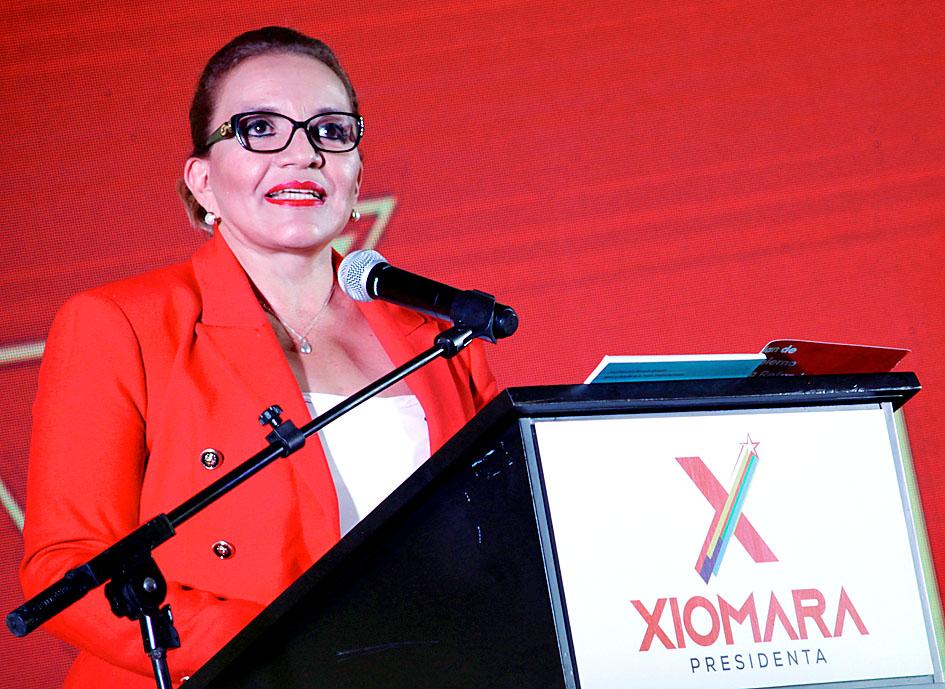Taiwan yesterday reminded its diplomatic ally Honduras of Beijing’s record of broken promises, after the Latin American nation’s main opposition party pledged to switch diplomatic recognition to Beijing.
The left-wing Liberty and Refoundation Party (LIBRE), led by ousted former Honduran president Manuel Zelaya, on Sunday said that if it wins November’s presidential election it would seek to establish diplomatic relations with China and “readjust” the country’s debt.
The party is for a second time fielding Zelaya’s wife, Xiomara Castro, who set out her plans at a news conference in Tegucigalpa.

Photo: Reuters
“I will order an international audit on the internal and external debt, and the readjustment of it,” said Castro, 61, without elaborating on what steps that would entail.
Honduras currently has diplomatic relations with Taiwan, but if victorious, Castro said she would “immediately open diplomatic and commercial relations with mainland China.”
Honduras is among only 15 UN member countries that maintain formal relations with Taiwan.
“Honduras must understand that the Chinese government’s promises have always been all flash and no substance,” Ministry of Foreign Affairs spokeswoman Joanne Ou (歐江安) said, adding that Beijing would try any “ploys to sabotage Taiwan’s diplomatic relations with our allies.”
The government was aware of the agenda outlined by LIBRE candidate Castro and would pay close attention to any developments, she added.
Taiwan and Honduras have enjoyed diplomatic relations for 80 years, during which they have cooperated on many successful projects universally supported by the Honduran government and its people, Ou said.
Building on this deep friendship, Taiwan would continue to improve cooperation and consolidate ties between the two nations, she added.
At the end of last year, Honduras had public debt of more than US$13 billion, equivalent to 55 percent of GDP, Honduran Ministry of Finance data showed.
Of that, US$8.45 billion was foreign debt.
No reliable polling has yet been published for the election, in which several candidates are to face Tegucigalpa Mayor Nasry Asfura, who is backed by Honduran President Juan Orlando Hernandez.
Hernandez’s rule has been dogged by allegations of vote-rigging in 2017 and accusations raised in US courts, which he denies, of his links to drug traffickers.
However, he remains an influential figure and his National Party is still the strongest force in Honduran politics.
Additional reporting by AFP

CHAOS: Iranians took to the streets playing celebratory music after reports of Khamenei’s death on Saturday, while mourners also gathered in Tehran yesterday Iranian Supreme Leader Ayatollah Ali Khamenei was killed in a major attack on Iran launched by Israel and the US, throwing the future of the Islamic republic into doubt and raising the risk of regional instability. Iranian state television and the state-run IRNA news agency announced the 86-year-old’s death early yesterday. US President Donald Trump said it gave Iranians their “greatest chance” to “take back” their country. The announcements came after a joint US and Israeli aerial bombardment that targeted Iranian military and governmental sites. Trump said the “heavy and pinpoint bombing” would continue through the week or as long

TRUST: The KMT said it respected the US’ timing and considerations, and hoped it would continue to honor its commitments to helping Taiwan bolster its defenses and deterrence US President Donald Trump is delaying a multibillion-dollar arms sale to Taiwan to ensure his visit to Beijing is successful, a New York Times report said. The weapons sales package has stalled in the US Department of State, the report said, citing US officials it did not identify. The White House has told agencies not to push forward ahead of Trump’s meeting with Chinese President Xi Jinping (習近平), it said. The two last month held a phone call to discuss trade and geopolitical flashpoints ahead of the summit. Xi raised the Taiwan issue and urged the US to handle arms sales to

State-run CPC Corp, Taiwan (CPC, 台灣中油) yesterday said that it had confirmed on Saturday night with its liquefied natural gas (LNG) and crude oil suppliers that shipments are proceeding as scheduled and that domestic supplies remain unaffected. The CPC yesterday announced the gasoline and diesel prices will rise by NT$0.2 and NT$0.4 per liter, respectively, starting Monday, citing Middle East tensions and blizzards in the eastern United States. CPC also iterated it has been reducing the proportion of crude oil imports from the Middle East and diversifying its supply sources in the past few years in response to geopolitical risks, expanding

Pro-democracy media tycoon Jimmy Lai’s (黎智英) fraud conviction and prison sentence were yesterday overturned by a Hong Kong court, in a surprise legal decision that comes soon after Lai was jailed for 20 years on a separate national security charge. Judges Jeremy Poon (潘兆初), Anthea Pang (彭寶琴) and Derek Pang (彭偉昌) said in the judgement that they allowed the appeal from Lai, and another defendant in the case, to proceed, as a lower court judge had “erred.” “The Court of Appeal gave them leave to appeal against their conviction, allowed their appeals, quashed the convictions and set aside the sentences,” the judges